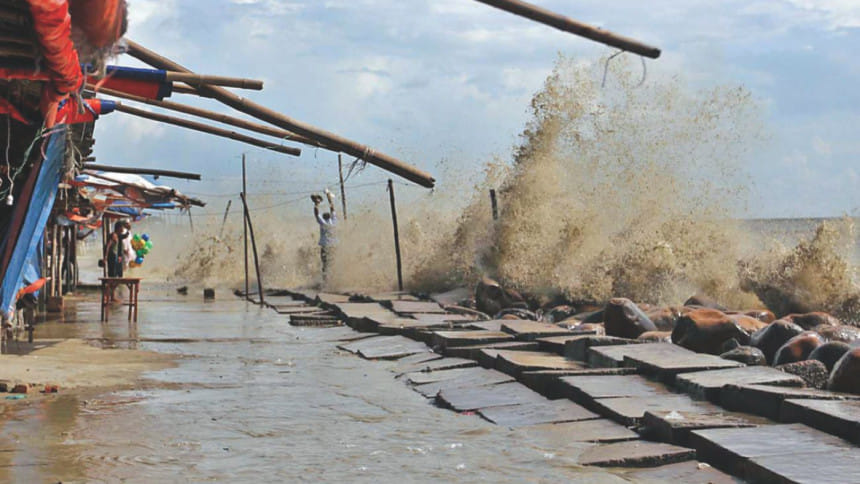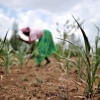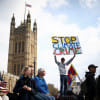Bangladesh moves up the climate change knowledge ladder

The climate change research community in Bangladesh, which consists of a few thousand natural, engineering and social scientists, based at several dozen organisations including public and private universities, national and international research organisations, Government and NGOs as well as some private sector organisations, came together over two years ago to form a collective platform for climate change knowledge generation and use, in Bangladesh which is called Gobeshona ( the Bangla word for "research"). This self-organised consortium of well over two dozen organisations has three objectives, namely to enhance the quality of climate change research conducted in the country, to enhance sharing of research results amongst researchers themselves as well as with others and finally to ensure that good quality research results are actually used by policy makers, planners and practitioners in Bangladesh as well as abroad.
In addition to these objectives it also holds an annual science conference each January to initially benchmark and then assess the addition of new knowledge in annual increments. The second annual Gobeshona conference on climate change research in Bangladesh was just completed a few days ago in Dhaka and I will share some, of the new findings and future directions of research below.
Enhancing research quality:
This part of the Gobeshona programme focuses on young researchers and provides them with training and mentoring, not so much on how to do the research itself, but rather how to ensure that the outputs of their research can be published in international peer reviewed scientific journals . This is done through a Young Researchers Support Programme through which each year about a dozen young researchers are selected and provided with training and mentoring to produce papers that are published internationally. The first batch of young researchers has successfully completed their programme and the second batch has also just started.
Sharing research amongst researchers:
The sharing of published research is done through the Gobeshona web portal (www.Gobeshona.net ) where we actively seek out nationally and internationally published research papers on climate change and Bangladesh and upload and archive them on the website. To date there are over a thousand research papers in the searchable archive.
In order to share ongoing research there is another section of the web portal where researchers can put up their ongoing research projects so others can know who is doing what. There are several dozen such ongoing research projects listed there.
There is also a monthly Gobeshona Seminar, hosted each month in turn by a different member of the consortium, where researchers can present their findings to their peers. This typically attracts fifty to sixty participants each month.
Gobeshona conferences:
The very first conference (Gobeshona 1) was held in January 2015 and brought together around 200 researchers from around Bangladesh, with a few international researchers also, to present around sixty scientific papers on different aspects of climate change in fifteen different thematic sessions over three days. The proceedings have been published and are available on the website. In addition a multi-chaptered book on the state of knowledge is being published by an international academic publisher.
Outputs of Gobeshona 2:
The second conference (Gobeshona 2) was held a few days ago and in addition to the three -day science conference also included this time a one-day Science Policy Dialogue Day where senior policy makers and planners attending to hear the latest research findings, and also for them to provide feedback on research questions that they would like the researchers to address in future.
Thus the annual conference is designed to take stock of current knowledge and directions for new research and then review progress each year.
I will share below some of the key new findings from Gobeshona 2 compared to Gobeshona 1 last year.
Firstly it is clear that climate change has already become a key national priority, in both planning and finance, and is no longer just an "environmental" issue that could be left to the Ministry of Environment to solve.
Secondly, the issue of migration and urbanisation under a climatically changing world are intimately linked and need to be tackled together to a large extent. Also while in the near term climate induced displacement and migration is a problem, in the longer term we may be able to make assisted or facilitated migration into an adaptation option for many millions from the coastal areas who may need to relocate inland over the coming decades.
Thirdly the outcome of the recently agreed Paris Agreement now needs to be implemented in Bangladesh both for mitigation as well as adaptation actions which need to be well integrated, or mainstreamed, into national, sectoral and local level planning.
Fourthly, Bangladeshi researchers are actually leading the world in a couple of areas of climate change research, namely in Community Based Adaptation (CBA). Indeed , Bangladesh will host the 10th International Conference on CBA in April this year where several hundred international participants are expected to attend and also in the new and emerging issue of Loss and Damage from climate change which will be a major part of the discussions at this year's Conference of Parties (COP22) of the United Nations Framework Convention on Climate Change (UNFCCC) in Morocco.
Fifthly and finally, the idea of developing a transparent climate finance system as a public private partnership between the Economic Resources Division (ERD) of the Ministry of Finance, and the research community in Bangladesh with national and international collaboration was identified as priority for the future.
International research collaboration:
One of the new characteristics of Gobeshona 2 was the participants of several dozen international researchers from the United States of America, Canada, Australia, Germany, UK, Tanzania, Uganda and Nepal who learned what Bangladeshi researchers were doing and also shared their own experiences. This also resulted a number of collaborative research projects being identified between Bangladeshi and international researchers.
Way forward:
The annual Gobeshona conference is now becoming a means of assessing how Bangladesh moves up the climate change knowledge ladder one annual rung at a time. The move from the first to second rung of the ladder shows good progress so far.
Going forward one significant outcome is the idea of developing a South-South Adaptation Technology Centre in Bangladesh initiated by the research and NGO communities based on Bangladesh's experience on different adaptation technologies, which could potentially become a public-private partnership if the government wishes to make it so.
The writer is Director of the International Centre for Climate Change and Development at the Independent University, Bangladesh.
Email: [email protected]

 For all latest news, follow The Daily Star's Google News channel.
For all latest news, follow The Daily Star's Google News channel. 








Comments